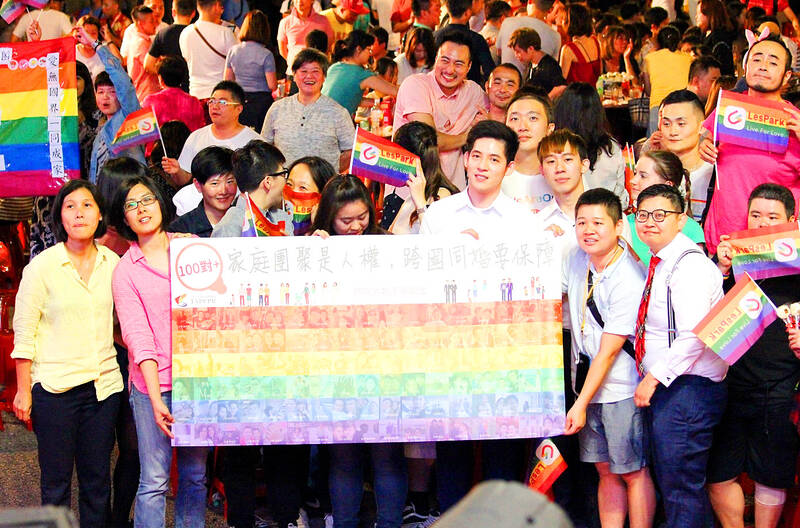In a sudden policy reversal, the government on Thursday said it would allow same-sex couples with one Taiwanese and one foreign national to register their marriage even if the foreign partner is from a jurisdiction that does not recognize same-sex unions.
In a directive to all local governments, the Ministry of the Interior said a previous practice that excluded such couples was discriminatory against them and contradicted the law on which same-sex marriage is based.
Taiwan in May 2019 became the first country in East Asia to legalize same-sex marriage following the enactment of the Act for Implementation of Judicial Yuan Interpretation No. 748 (司法院釋字第748號解釋施行法).

Photo courtesy of TAPCPR
Over the past four years, however, same-sex couples that include one partner from a country or region that does not recognize same-sex marriage have been barred from officially tying the knot in Taiwan. Household registration offices across the country have rejected applications for marriage registration by such couples based on a directive issued by the ministry in July 2019.
The directive cited Article 46 of the Act Governing the Choice of Law in Civil Matters Involving Foreign Elements (涉外民事法律適用法), which stipulates that the formation of a marriage is governed by the foreign partner’s home country.
Affected cross-national same-sex couples have challenged the rule, mostly with the pro bono support of the Taiwan Alliance to Promote Civil Partnership Rights, by suing household registration offices that rejected their marriage registrations.
Since March 2021, the Taipei High Administrative Court has ruled in favor of all five cross-national same-sex couples, involving partners from Hong Kong, Japan Malaysia, Macau and Singapore, who filed lawsuits over their rejected marriage registrations.
In three of those cases, the court overrode the ministry’s directive and instead based its ruling on Article 8 of the same act, which stipulates that the law of a foreign country shall not be applied if it results in “a violation of the public order or boni mores of the Republic of China.”
Despite those rulings, the ministry said they were isolated cases and that it was legally bound to continue rejecting the registration of marriages by certain cross-national same-sex couples in accordance with Article 46.
However, the ministry’s directive issued on Thursday, which took effect immediately, instructed household registration offices to adopt Article 8 instead of Article 46 when cross-national same-sex couples apply to register their union.
The ministry said the change in policy is in line with a decision at a Cabinet meeting on Tuesday last week, adding that it was made because the administrative court had made “consistent” judgements on the matter in several lawsuits.
However, the ministry said that the new rule would not apply to same-sex couples involving one partner from China, which does not recognize same-sex marriage, as cross-strait marriages are governed by separate laws.
Cross-strait rules stipulate that such same-sex couples would have to register their marriage in China before they can apply in Taiwan, it said.
In a statement on Thursday night, several rights groups, including the Taiwan Alliance to Promote Civil Partnership Rights and the Taiwan Association for Human Rights, welcomed the ministry’s new rule, saying it demonstrates the Cabinet’s efforts to grant equal rights to the same-sex community.
However, they said it is regrettable that hurdles remain for same-sex couples involving a Chinese partner, adding that they would continue to urge the government to grant all same-sex couples equal rights.

The Central Election Commission has amended election and recall regulations to require elected office candidates to provide proof that they have no Chinese citizenship, a Cabinet report said. The commission on Oct. 29 last year revised the Measures for the Permission of Family-based Residence, Long-term Residence and Settlement of People from the Mainland Area in the Taiwan Area (大陸地區人民在台灣地區依親居留長期居留或定居許可辦法), the Executive Yuan said in a report it submitted to the legislature for review. The revision requires Chinese citizens applying for permanent residency to submit notarial documents showing that they have lost their Chinese household record and have renounced — or have never

A magnitude 5.6 earthquake struck off the coast of Yilan County at 12:37pm today, with clear shaking felt across much of northern Taiwan. There were no immediate reports of damage. The epicenter of the quake was 16.9km east-southeast of Yilan County Hall offshore at a depth of 66.8km, Central Weather Administration (CWA) data showed. The maximum intensity registered at a 4 in Yilan County’s Nanao Township (南澳) on Taiwan’s seven-tier scale. Other parts of Yilan, as well as certain areas of Hualien County, Taipei, New Taipei City, Taoyuan, Hsinchu County, Taichung and Miaoli County, recorded intensities of 3. Residents of Yilan County and Taipei received

Taiwan has secured another breakthrough in fruit exports, with jujubes, dragon fruit and lychees approved for shipment to the EU, the Ministry of Agriculture said yesterday. The Animal and Plant Health Inspection Agency on Thursday received formal notification of the approval from the EU, the ministry said, adding that the decision was expected to expand Taiwanese fruit producers’ access to high-end European markets. Taiwan exported 126 tonnes of lychees last year, valued at US$1.48 million, with Japan accounting for 102 tonnes. Other export destinations included New Zealand, Hong Kong, the US and Australia, ministry data showed. Jujube exports totaled 103 tonnes, valued at

BIG SPENDERS: Foreign investors bought the most Taiwan equities since 2005, signaling confidence that an AI boom would continue to benefit chipmakers Taiwan Semiconductor Manufacturing Co’s (TSMC, 台積電) market capitalization swelled to US$2 trillion for the first time following a 4.25 percent rally in its American depositary receipts (ADR) overnight, putting the world’s biggest contract chipmaker sixth on the list of the world’s biggest companies by market capitalization, just behind Amazon.com Inc. The site CompaniesMarketcap.com ranked TSMC ahead of Saudi Aramco and Meta Platforms Inc. The Taiwanese company’s ADRs on Tuesday surged to US$385.75 on the New York Stock Exchange, as strong demand for artificial intelligence (AI) applications led to chip supply constraints and boost revenue growth to record-breaking levels. Each TSMC ADR represents